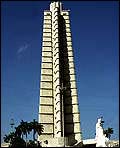Cuba
is governed under a constitution adopted in 1976, as subsequently
amended. It defines the country as a socialist state  in
which all power belongs to the working people. The Communist Party
is Cuba's only legal political party. in
which all power belongs to the working people. The Communist Party
is Cuba's only legal political party.
The central legislature of Cuba is the National Assembly of People's
Power, whose 510 members are elected to five-year terms by direct
universal voting. The National Assembly, which regularly meets
twice during the year, elects a Council of State of about 30 members
to carry out its functions when it is not in session. The Council
of State includes a president, who is the country's head of state;
a first vice president; and five other vice presidents. The National
Assembly also chooses a Council of Ministers, which is Cuba's
chief administrative body. The council is headed by the president.
Cuba is divided into 169 municipalities and 14 provinces; the
Isla de la Juventud municipality is not part of any province,
and its affairs are overseen directly by the central government.
Each municipality has an assembly composed of delegates elected
to terms of two and one-half years. The municipal assemblies choose
executive committees, the members of which make up five regional
assemblies for each province. These regional bodies also have
executive committees, which together form the membership of the
provincial assembly (in turn, headed by an executive committee).
At each level the executive committee oversees the day-to-day
administrative functions of its assembly.
Judicial power is exercised by the People's Supreme Court on
the national level, by courts of justice in cases that are provincial
or regional in nature, and by the municipal courts. Revolutionary
tribunals are convened to deal with crimes against the state.
|

